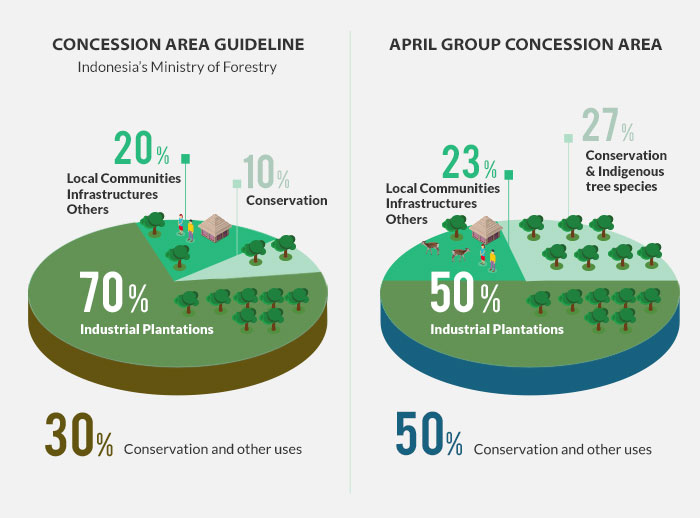Forest Conservation
Forest conservation is the practice of planting and maintaining forested areas for the benefit and sustainability of future generations.
As one of the major forms of the natural landscape, the forest resources are valuable as an integral part of the ecosystem, from the commercial point of view, and as providers of shelter to wildlife. It is no secret that the future of our planet desperately needs to be safeguarded, with climate change already wreaking havoc on our natural environment. The United Nations stress the important to ensure the viability of ecosystems essential to human wellbeing. The global institution aims thirty percent of Earth's surface across land and sea should become protected areas in 2030.
To achieve it, we need to reduce the amount of harm that human activities have on the environment and support the natural world as much as we can, be it a more responsible business practices, less greenhouse gases, to always finish your food. In fact, scientists warn we only have another 10 years to prevent the health of our planet from failing or humanity will suffer devastating consequences. And this is where conservation plays it roles. Besides being home for flora and fauna, some forests are regarded as High Conservation Value (HCV) areas - natural habitats, which are of outstanding significance or critical importance due to their high biological, ecological, social or cultural values.
Originally developed by the Forest Stewardship Council (FSC) in 1999, HCV concept is use in forest management certification. It is now a base principle of sustainability standards for many natural resources-based industry, including palm oil, soy, sugar, biofuels, carbon, as well as for landscape mapping, conservation and natural resource planning and advocacy
Since 2005, APRIL Group has committed to the conservation of environmentally valuable forest within our concession areas. We have conducted 37 High Conservation Value (HCV) assessments using the HCV Indonesia Toolkit.
APRIL conserves, restores and protects 365,733 hectares of forest, which includes 150,693 hectares of peatland swamp forest as part of the Restorasi Ekosistem Riau program located on the Kampar Peninsula and Padang Island. This activity, through which APRIL both conserves existing forest and restores previously degraded forest areas, is in line with the commitments prohibiting deforestation in our SFMP 2.0. APRIL’s SFMP 2.0 commitments, which apply to the company’s suppliers, are effective from the launch of the policy, on 3 June 2015, onwards.
These conservation and eco-restoration areas sit within the 1 million hectares allocated to APRIL Group for forestry under concessions granted by the Indonesian government. Of this area, approximately 450,000 hectares is set aside for sustainable plantation. First planted in 1993, it is home to third and fourth generation renewable plantation. The remaining land is set aside for community use and infrastructure.
Find out more about our Eco-Restoration efforts.
We are ever mindful that some of our granted concession areas reside on peatland, which stores carbon. We take a science-based approach to managing peatland, ensuring water levels are optimised and release of carbon stocks is minimised over the long term, while ensuring that our operations complement the broader social and economic development aims of the fast-growing Riau Province.
Find out more about our Peatland Management.
Integrated plantation management is central to our conservation efforts, where we implement ‘ring plantations’ as a way to protect conservation forest from encroachment and degradation. It works by establishing an Acacia plantation on the periphery of our concessions, creating a buffer zone that helps to conserve the core conservation forest area making illegal logging and human encroachment less likely while also working to conserve wildlife living in the interior.
The ring plantation approach generates an economic return as well as the resources and employment opportunities to support the livelihood of local communities. In this way, we are working to achieving a balance between renewable plantation and conservation and protection.
Indonesia's Forest

Indonesia has about 131 million hectares of forest. The Indonesian Government has set aside 53 million hectares of that for conservation and protection forests and 78 million hectares for production forests.
Of the area set aside for production purposes, the Government has designated 10.5 million hectares for industrial forest plantation, which includes plantations used to produce raw materials for pulp and paper, building materials and furniture. Less than half is used for pulp and paper plantations. The balance 67.5 million hectares of the total production forest area is used for agriculture, including palm oil plantations, rubber plantations, and also for infrastructure and residential purposes.
Of the 78 million hectares set aside for production forests, APRIL Group has been granted 1 million hectares of concession area, of which 480,000 hectares are plantations. Our land concessions account for just 1.3% of the total production forest areas – and our plantations are only 0.6 per cent of total production forest areas (or 0.4 per cent of the total forest in Indonesia).
APRIL is committed to protecting the forest areas under its management from unauthorised or illegal resource use, and other unlawful activities. This commitment applies to all APRIL suppliers.

